构建可并行的大语言模型网络
在过去几年中,随着深度学习技术的迅速发展,尤其是大规模预训练模型(如GPT、LLaMA以及盘古等)的出现,人工智能领域取得了巨大的进步。然而,随着模型规模的不断扩展,这些大模型所需的计算资源,特别是显存需求,呈指数级增长。以盘古71B为例,在半精度(FP16)下,这些参数本身就需要约142GB的显存。同时大模型日益膨胀的序列长度也给显存带了极大的压力。 显存不仅影响了模型的加载,还限制了批处理(batch size)较小的批处理可能会降低推理效率的下降,进而影响整个系统的吞吐量。
显存的压力使得单一设备很难在合理时间内完成推理任务,并行计算成为应对这一挑战的关键。
模型并行
当模型参数量过大,超出单个设备的显存容量时,模型并行能够将模型的不同部分分配到多个设备上运行。这种方法有效降低了单一设备的显存需求,并允许更大规模的模型推理。
基础矩阵乘模块


在大模型计算中,矩阵乘(MatMul)不管是在权重还是计算量上都占了相当大的比例。观察矩阵乘,其拥有列可切分性(Column-wise Parallelism)和行可切分性(Row-wise Parallelism)。
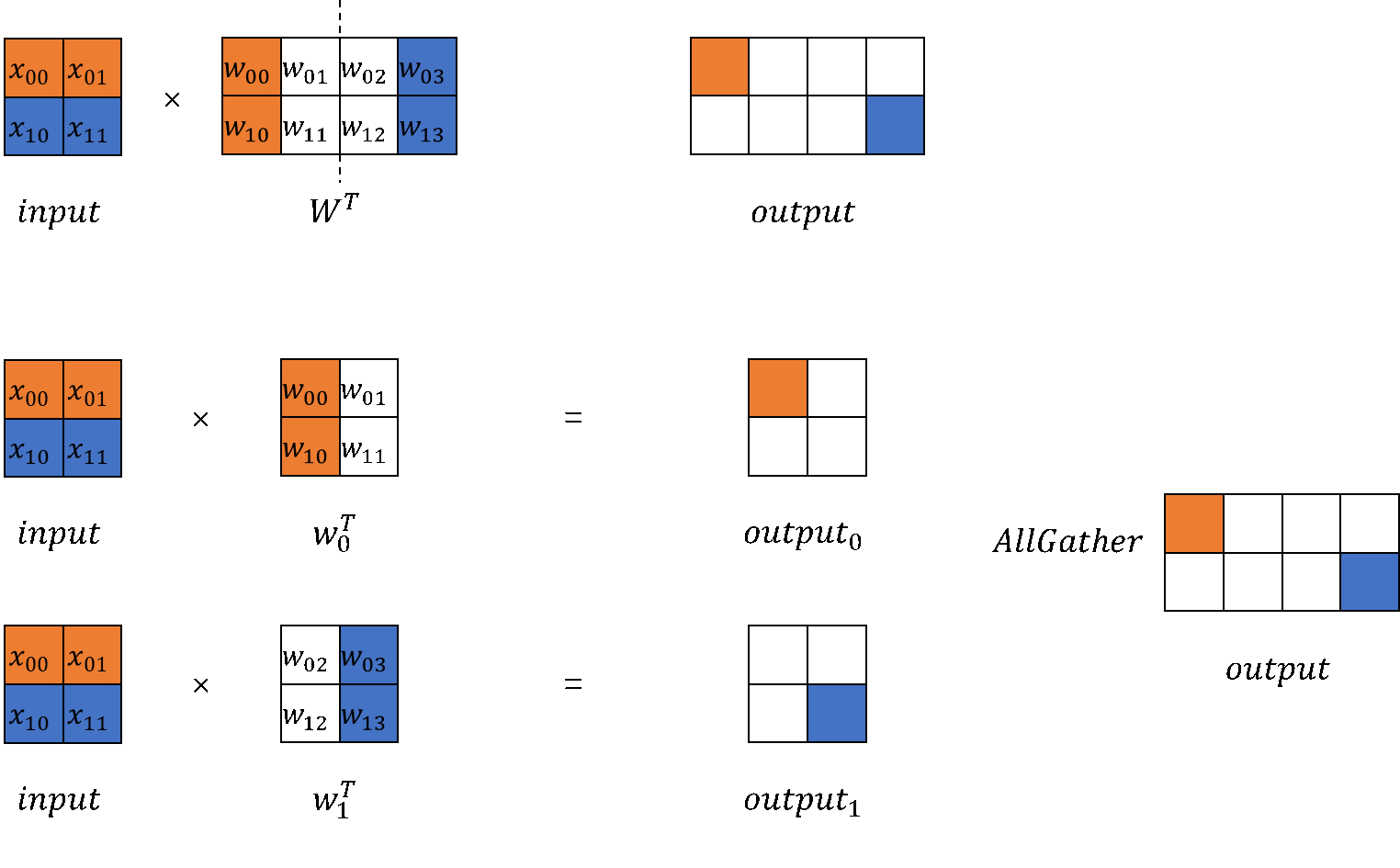

以MindSpore原始实现的nn.Dense为起点,分别构建列切和行切的矩阵乘实现。
通信域的创建和管理,大模型配置的管理 构建
CommunicationHelper类管理模型并行的域。from mindspore.communication import create_group, get_group_size
class CommunicationHelper: def __init__(self, group_name, size): self.group_name = group_name self.size = size self.rank_list = [i for i in range(size)] def create_tensor_model_parallel_group(self): create_group(group=self.group_name, rank_ids=self.rank_list) def get_tensor_model_parallel_group_size(self): return get_group_size(group=self.group_name) def get_tensor_model_parallel_group(self): return self.group_name
构建
ConfigHelper管理并配置大模型参数。class ConfigHelper: def __init__(self, vocab_size, hidden_size, ffn_hidden_size, num_layers, batch_size, seq_length, dtype, num_heads, has_bias=False): self.vocab_size = vocab_size self.hidden_size = hidden_size self.ffn_hidden_size = ffn_hidden_size self.num_layers = num_layers self.batch_size = batch_size self.seq_length = seq_length self.dtype = dtype self.num_heads = num_heads self.has_bias = has_bias
列切矩阵乘
ColumnParallelLinear类,在通过模型并行的设备数计算切分后的权重shape并初始化,列切是切分out_channels;在模型前向,调用矩阵乘计算出并行的结果;最后可以选择对并行的结果进行AllGather,以得到完整的输出。MindSpore训推一体框架支持开启infer_boost,该参数会使MS框架开启高性能自研算子库。启动该模式需要:
设置变量:
from mindspore import set_context set_context(jit_config={"jit_level": 'O0', "infer_boost": 'on'})
设置系统环境变量:
export ASCEND_HOME_PATH={$ascend_custom_path}
以模型并行device数是2时为例,设置环境变量和初始化通信组,并配置大模型参数config。
from mindspore import nn, Parameter, ops, Tensor from mindspore.common import dtype as mstype from mindspore.communication import init from mindspore.common.initializer import initializer import numpy as np from mindspore import set_context set_context(jit_config={"jit_level": 'O0', "infer_boost": 'on'}) TP_GROUP_NAME='tp' TP_SIZE = 2 COMMUN_HELPER = CommunicationHelper(group_name=TP_GROUP_NAME, size=TP_SIZE) init() COMMUN_HELPER.create_tensor_model_parallel_group() config = ConfigHelper(batch_size=64, vocab_size=32000, num_layers=4, seq_length=2048, hidden_size=1024, ffn_hidden_size=4096, dtype=mstype.float16, num_heads=8, has_bias=False)
列切矩阵乘模块
class ColumnParallelLinear(nn.Cell): def __init__(self, in_channels, out_channels, weight_init=None, bias_init=None, has_bias=True, dtype=mstype.float32): super().__init__() self.in_channels = in_channels self.out_channels = out_channels self.has_bias = has_bias self.tensor_parallel_group_size = COMMUN_HELPER.get_tensor_model_parallel_group_size() self.out_channels_per_partition = out_channels // self.tensor_parallel_group_size self.dtype = dtype weight_shape = (self.out_channels_per_partition, self.in_channels) self.weight = Parameter(initializer(weight_init, weight_shape, self.dtype), name="weight") if self.has_bias: self.bias = Parameter(initializer(bias_init, (self.out_channels_per_partition), self.dtype), name="bias") self.bias_add = ops.Add() self.matmul = ops.BatchMatMul(transpose_b=True) self.cast = ops.Cast() def construct(self, x): origin_dtype = x.dtype x = self.cast(x, self.dtype) out = self.matmul(x, self.weight) if self.has_bias: out = self.bias_add( out, self.cast(self.bias, self.dtype) ) out = self.cast(out, origin_dtype) return out
列切矩阵乘法的输出是并行的,若需要得到完整的输出,可通过
GatherLastDim得到。class GatherLastDim(nn.Cell): def __init__(self): super().__init__() self.all_gather = ops.AllGather(group=COMMUN_HELPER.get_tensor_model_parallel_group()) self.world_size = COMMUN_HELPER.get_tensor_model_parallel_group_size() self.split = ops.Split(axis=0, output_num=self.world_size) def construct(self, input_): output = self.all_gather(input_) tensor_list = self.split(output) output = ops.cat(tensor_list, axis=-1) return output
列切矩阵乘法的推理:
column_parallel_linear = ColumnParallelLinear(in_channels=config.hidden_size, out_channels=config.hidden_size, weight_init='normal', dtype=config.dtype, has_bias=False) input_x = Tensor(np.random.randn(config.batch_size, config.seq_length, config.hidden_size).astype(np.float32)) out_parallel = column_parallel_linear(input_x) print(out_parallel.shape) gather_last_dim = GatherLastDim() out = gather_last_dim(out_parallel) print(out.shape)
行切矩阵乘
与列切相同,
RowParallelLinear根据模型并行域的大小切分权重;在初始化时,切分方向是行,因此切分in_channels维度后初始化;在模型前向,输入与权重进行矩阵乘后,需要对所有device上的结果进行AllReduce行切矩阵乘模块实现如下:
class RowParallelLinear(nn.Cell): def __init__(self, in_channels, out_channels, weight_init='normal', bias_init=None, has_bias=True, dtype=mstype.float32): super().__init__() self.in_channels = in_channels self.out_channels = out_channels self.has_bias = has_bias self.tensor_parallel_group_size = COMMUN_HELPER.get_tensor_model_parallel_group_size() self.in_channels_per_partition = in_channels // self.tensor_parallel_group_size self.dtype = dtype weight_shape = (self.out_channels, self.in_channels_per_partition) self.weight = Parameter(initializer(weight_init, weight_shape, self.dtype), name="weight") if self.has_bias: self.bias = Parameter(initializer(bias_init, (self.in_channels_per_partition), self.dtype), name="bias") self.bias_add = ops.Add() self.bmm = ops.BatchMatMul(transpose_b=True) self.all_reduce = ops.AllReduce(group=COMMUN_HELPER.get_tensor_model_parallel_group()) self.cast = ops.Cast() def construct(self, x): origin_dtype = x.dtype x = self.cast(x, self.dtype) output_parallel = self.bmm(x, self.weight) if self.has_bias: output_parallel = self.bias_add(output_parallel, self.cast(self.bias, self.dtype)) out = self.all_reduce(output_parallel) out = self.cast(out, origin_dtype) return out
行切矩阵乘法的推理:
row_parallel_linear = RowParallelLinear(in_channels=config.hidden_size, out_channels=config.hidden_size, weight_init='normal', dtype=config.dtype, has_bias=False) out = row_parallel_linear(out_parallel) print(out.shape)
Embedding 除了矩阵乘之外,Embedding层也可以进行并行计算。将Embedding权重切分多若干个device上,每个device负责映射不同范围token_ids。
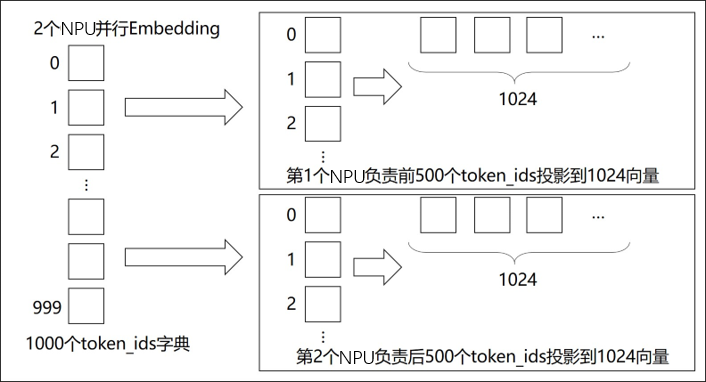 具体而言
具体而言
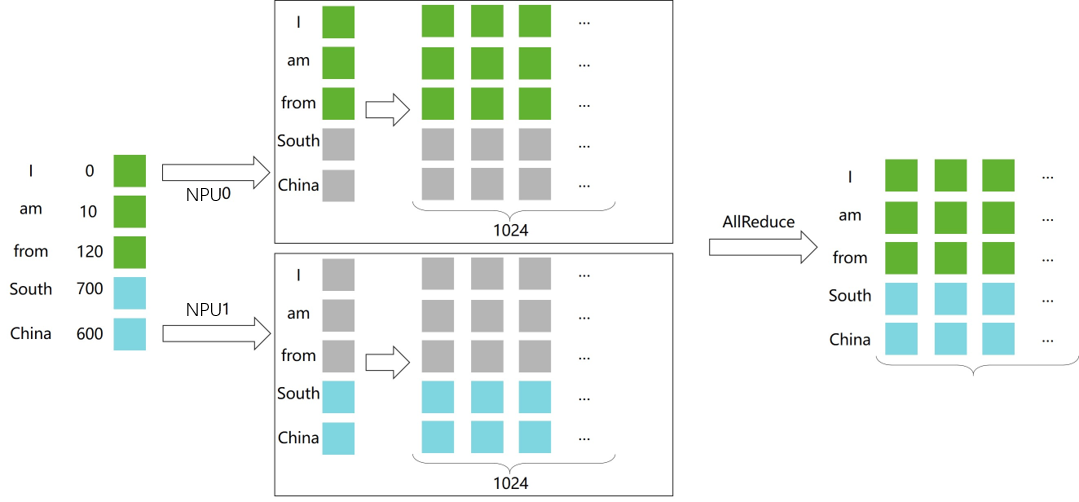
以nn.Embedding为基础,构建模型并行的Embedding层:
class VocabParallelEmbedding(nn.Cell): def __init__(self, num_embeddings, embedding_dim, init_method="normal", init_type=mstype.float32): super().__init__() self.num_embeddings = num_embeddings self.embedding_dim = embedding_dim self.tensor_model_parallel_size = COMMUN_HELPER.get_tensor_model_parallel_group_size() per_partition_vocab_size = self.num_embeddings // self.tensor_model_parallel_size self.vocab_start_index = COMMUN_HELPER.get_tensor_model_parallel_group_rank() * per_partition_vocab_size self.vocab_end_index = self.vocab_start_index + per_partition_vocab_size self.num_embeddings_per_partition = ( self.vocab_end_index - self.vocab_start_index ) self.embedding_weight = Parameter( initializer( init=init_method, shape=(self.num_embeddings_per_partition, self.embedding_dim), dtype=init_type, ), name="embedding_weight", ) self.all_reduce = ops.AllReduce(group=COMMUN_HELPER.get_tensor_model_parallel_group()) self.max_index_per_partition = Tensor(self.num_embeddings_per_partition - 1, dtype=mstype.int32) self.expand_dims = ops.ExpandDims() self.gather = ops.Gather() self.sub = ops.Sub() self.relu = ops.ReLU() self.minimum = ops.Minimum() self.eq = ops.Equal() self.mul = ops.Mul() def construct(self, x): displaced_x = self.sub(x, self.vocab_start_index) down_truncated_x = self.relu(displaced_x) truncated_x = self.minimum(down_truncated_x, self.max_index_per_partition) input_mask = self.eq(displaced_x, truncated_x) input_mask = self.expand_dims(input_mask, -1) output_parallel = self.gather(self.embedding_weight, truncated_x, 0) output_parallel = self.mul(output_parallel, input_mask) output = self.all_reduce(output_parallel) return output
并行Embedding推理:
input_ids = np.random.randint(0, config.vocab_size, size=(config.batch_size, config.seq_length), dtype=np.int32) input_ids = Tensor(input_ids) embedding_output = vocab_parallel_embedding(input_ids) print(embedding_output.shape)
TransformerModel并行适配
可以看出张量按顺序,先经过ColumnParallelLinear列切矩阵乘得到并行的结果,然后输入RowParallelLinear行切矩阵乘,就能得到完整的两次矩阵乘结果。
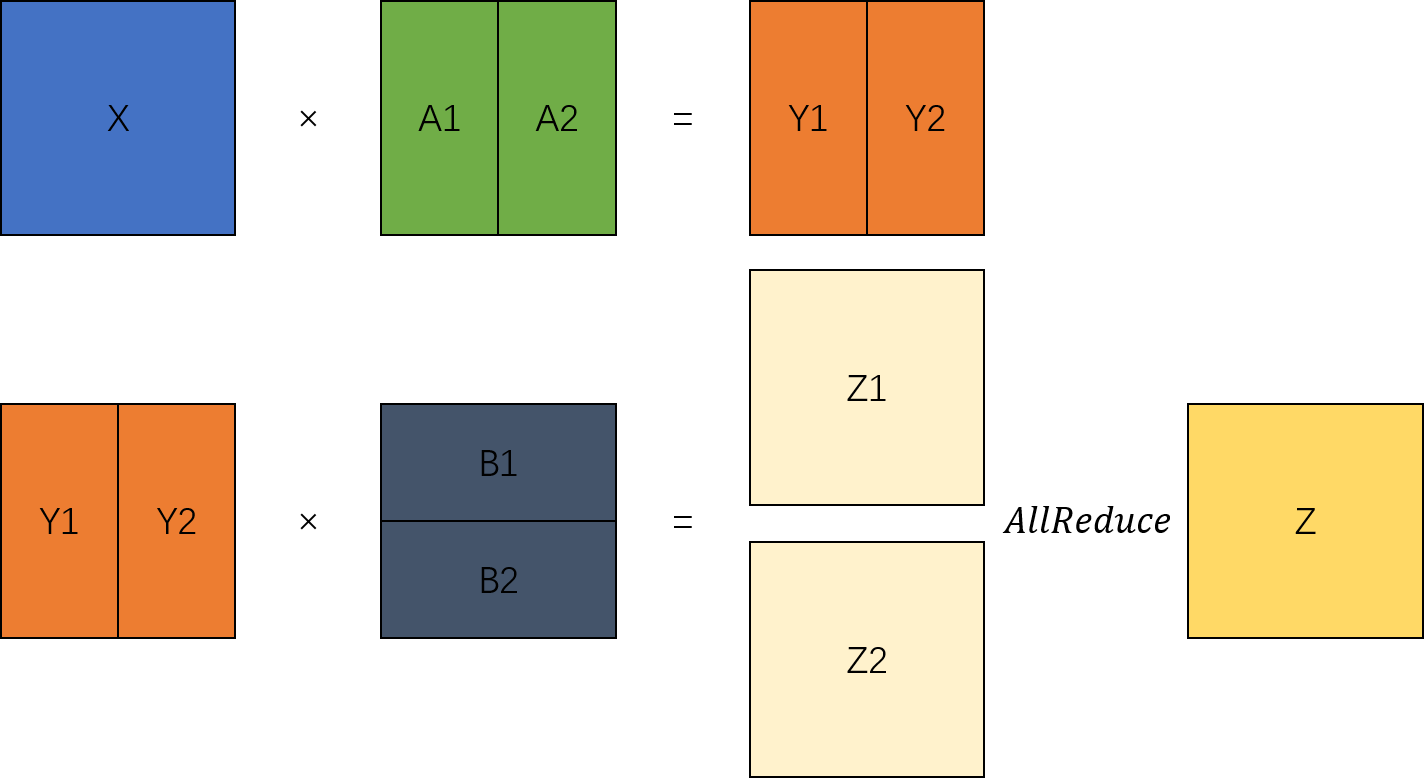
根据以上的分析,可以将模型构建中构建的TransformerModel模型修改为支持并行切分的模型结构。
Attention
以MHA(Multi Head Attention)为例,Transformer中典型的Attention模块是多头的,每个注意力头相互独立,因此在保证单个注意力头完整的情况下,激活值在
hidden_size的维度是可切。如假设一个MHA的头数num_heads是16,每个头的维度head_dim是256,hidden_size就是4096,计算Q/K/V的Linear的in/out都是4096。当模型并行tensor_model_parallel=4时,这些Linear被切分到4个device,每个device(4096,1024),等于每个device计算4个头。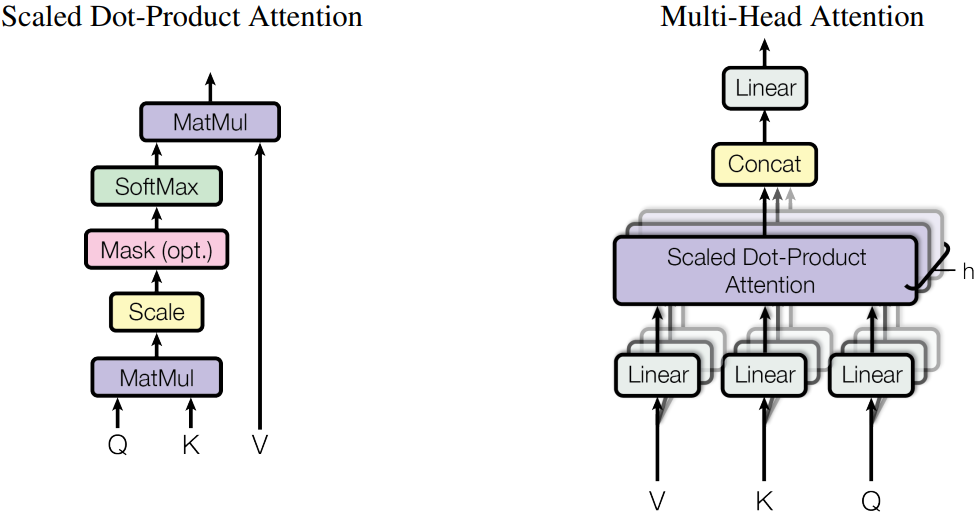
Attention模块编码示例:
class ParallelAttention(nn.Cell): def __init__(self, config): super().__init__() self.tensor_model_parallel_size = COMMUN_HELPER.get_tensor_model_parallel_group_size() self.num_heads_per_partition = config.num_heads // self.tensor_model_parallel_size self.head_dim = config.hidden_size // config.num_heads self.norm_factor = math.sqrt(self.head_dim) self.q = ColumnParallelLinear(in_channels=config.hidden_size, out_channels=config.hidden_size, weight_init='normal', has_bias=config.has_bias) self.k = ColumnParallelLinear(in_channels=config.hidden_size, out_channels=config.hidden_size, weight_init='normal', dtype=config.dtype, has_bias=config.has_bias) self.v = ColumnParallelLinear(in_channels=config.hidden_size, out_channels=config.hidden_size, weight_init='normal', dtype=config.dtype, has_bias=config.has_bias) self.flash_attention = ops.operations.nn_ops.FlashAttentionScore(head_num=self.num_heads_per_partition, scale_value=1.0/self.norm_factor, next_tokens=0) self.out = RowParallelLinear(in_channels=config.hidden_size, out_channels=config.hidden_size, weight_init='normal', dtype=config.dtype, has_bias=config.has_bias) def construct(self, x, mask): query = self.q(x) key = self.k(x) value = self.v(x) _, _, _, context_layer = self.flash_attention(query, key, value, attn_mask=mask) output = self.out(context_layer) return output
MLP
MLP模块其实是2个全连接层,也可以使用矩阵乘的并行切分来处理,具体代码如下:
class ParallelMLP(nn.Cell): def __init__(self, config): super().__init__() self.w1 = ColumnParallelLinear(in_channels=config.hidden_size, out_channels=config.ffn_hidden_size, weight_init='normal', dtype=config.dtype, has_bias=config.has_bias) self.w2 = RowParallelLinear(in_channels=config.ffn_hidden_size, out_channels=config.hidden_size, weight_init='normal', dtype=config.dtype, has_bias=config.has_bias) self.act_func = nn.SiLU() self.mul = ops.Mul() def construct(self, x): x = self.w1(x) x = self.act_func(x) output = self.w2(x) return output
TransformerLayer
TransformerLayer层由Attention和MLP构成,由于没有可并行的单算子,只需要将并行参数透传给Attention和MLP即可。
class ParallelTransformerLayer(nn.Cell): def __init__(self, config): super().__init__() self.attention = ParallelAttention(config=config) self.feed_forward = ParallelMLP(config=config) self.attention_norm = RMSNorm(dim=config.hidden_size, dtype=config.dtype) self.ffn_norm = RMSNorm(dim=config.hidden_size, dtype=config.dtype) self.add = ops.Add() def construct(self, x, mask): norm_output = self.attention_norm(x) attention_output = self.attention(norm_output, mask) norm_input = self.add(x, attention_output) norm_output = self.ffn_norm(norm_input) mlp_output = self.feed_forward(norm_output) output = self.add(norm_input, mlp_output) return output
TransformerModel
class ParallelTransformer(nn.Cell): def __init__(self, config): super().__init__() self.embedding = VocabParallelEmbedding(num_embeddings=config.vocab_size, embedding_dim=config.hidden_size, init_method='normal', init_type=config.dtype) self.layers = nn.CellList() self.num_layers = config.num_layers for _ in range(config.num_layers): layer = ParallelTransformerLayer(config=config) self.layers.append(layer) self.norm_out = RMSNorm(dim=config.hidden_size, dtype=config.dtype) def construct(self, x, mask): hidden_state = self.embedding(x) for i in range(self.num_layers): hidden_state = self.layers[i](hidden_state, mask) hidden_state = self.norm_out(hidden_state) return hidden_state
具体端到端的大语言模型代码工程可以参考model_dev.py脚本,运行下面命令进行验证:
msrun --worker_num 2 --local_worker_num 2 --master_port 8124 --log_dir msrun_log --join True --cluster_time_out 300 model_dev.py